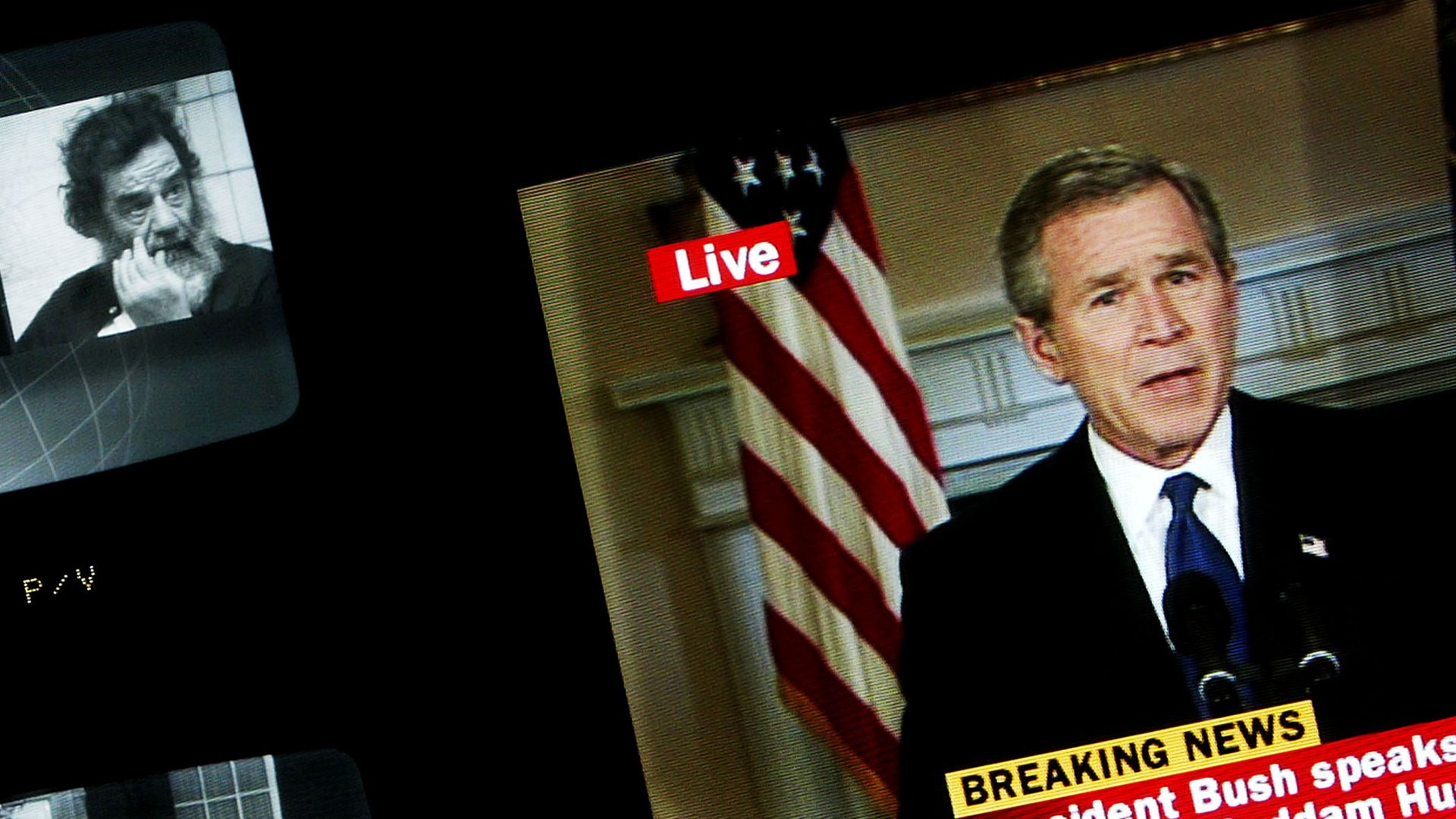President George W. Bush viewed the 2003 invasion of Iraq as a “crusade” by “God’s chosen nation,” according to newly released documents from Britain’s National Archives. The documents, previously labeled as classified by the British government, paint a largely negative portrait of Bush and other U.S. officials on the eve of war.
In private, the documents show, British officials expressed skepticism in late 2002 and early 2003 of the Bush administration’s claims that the war would be short and that it would be paid for by seizing Iraqi oil.
The war lasted more than seven years, cost $3 trillion, and killed 3,482 U.S. service members and about 200,000 Iraqi civilians.
Bush’s office did not respond to a request for comment.
‘Messianic appeal’
In confidential cables to London, first reported Tuesday, July 22, by the British newspaper The Telegraph, the U.K.’s ambassador to the United States wrote that Bush was convinced it was his “mission” to overthrow Saddam Hussein, the Iraqi dictator.
Christopher Meyer wrote in December 2002 that, after months of bullying, Bush was relying on a “messianic appeal” for allies to join a U.S. invasion.
“The U.S. has been ill-served by its rhetoric: at times high-flown, neo-imperialist, moralizing, unilateralist, bellicose,” Meyer wrote. “Washington’s great strategic failure was, almost without noticing, to allow the dissipation in 2002 of post-9/11 sympathy for America abroad.”
The terrorist attacks of Sept. 11, 2001, drove Bush’s decisions on Iraq, Meyer wrote — even though no evidence existed then, or now, that linked Iraq to al Qaeda’s assaults on New York and Washington.
“The aftershocks of 9/11 reverberate through American politics and life,” Meyer wrote in a year-end report to London. “They sustain Bush politically, hobble the Democrat opposition, and make forward defense against terrorism, and Saddam Hussein, the organizing principle of U.S. foreign and security policy.”
“Much of the impulse for deposing Saddam Hussein comes from Bush himself,” Meyer continued. “More than anything, he fears another catastrophic terrorist attack on the homeland, especially one with an Iraqi connection. His view of the world is Manichean. He sees his mission as ridding it of evil-doers. He believes American values should be universal values. He finds the Europeans’ differentiation between Osama Bin Laden and Saddam Hussein self-serving. He is strongly allergic to Europeans collectively.”
Meyer, who later wrote a memoir that criticized the war, concluded his cable with an insulting stereotype to describe Bush’s thinking.
“Anyone who has sat round a dinner table with low-church Southerners,” he wrote, “will find these sentiments instantly recognizable.”
‘Call of history’
Unbiased. Straight Facts.TM
The Iraq War lasted more than seven years, cost $3 trillion, and killed 3,482 U.S. service members and about 200,000 Iraqi civilians. Newly released British documents reflect on the war’s origins.
The following month, in January 2003, Meyer sent London an update that said it was increasingly clear the United States was preparing for war and assuming Britain would be by its side.
“It is politically impossible for Bush to back down from going to war in Iraq this spring,” Meyer wrote, “absent Saddam’s surrender or disappearance from the scene.”
In Bush’s State of the Union address, Meyer said, “He said in effect that destroying Saddam is a crusade against evil to be undertaken by God’s chosen nation: ‘this call of history has come to the right people.’”
Meyer said little of what became the most controversial sentence of Bush’s speech — the 16 words that claimed evidence existed of Iraq’s efforts to obtain weapons of mass destruction.
“The British government,” Bush said, “has learned that Saddam Hussein recently sought significant quantities of uranium from Africa.”
A high-ranking official from the Bush administration later said the evidence was inconclusive at best, according to Politico. U.S. troops found no evidence of a nuclear weapons program after the invasion.
Meyer recounted the State of the Union speech as British Prime Minister Tony Blair prepared for a meeting with Bush at Camp David.
“Unless we have some good ideas for sending Saddam into exile, Mr. Blair’s task on Friday will be to ensure that we and the U.S. go to war in the best company possible,” Meyer wrote. “That means securing the time to assemble the largest possible coalition both for the war itself and for the aftermath.”
“If the notorious smoking gun can be found,” he added, “this will make things easier.”
‘Make or break’
The newly released documents indicate that British officials were convinced that invading Iraq posed enormous political risks in both the United States and the U.K.
Meyer reported to London that during his U.S. travels, he had encountered no one eager for war in Iraq, “apart from a single oil man in Houston.”
“If Bush decides to invade Iraq in 2003, as looks increasingly likely, it will make or break his presidency,” Meyer said.
Blair’s foreign policy adviser, David Manning, saw similar challenges for the British leader.
Blair would be “forced from office” if Britain joined in an invasion without buy-in from the United Nations, Manning wrote in a memo to Blair’s Cabinet.
“The U.S. must not promote regime change in Baghdad,” Manning wrote, “at the price of regime change in London.”
